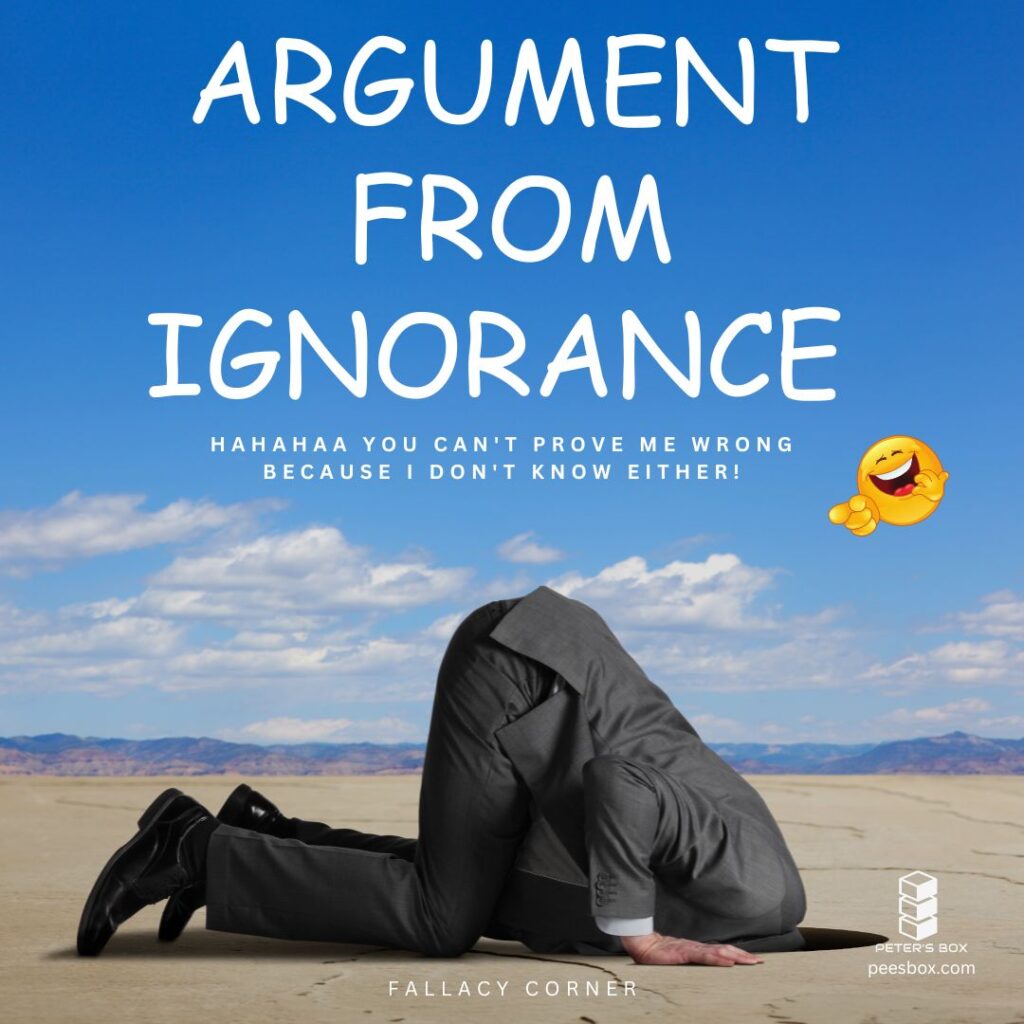Last updated on September 12th, 2023 at 08:42 am
An argument from ignorance is a logical fallacy I like to call the ‘you can’t prove me wrong’ fallacy. You will understand why in a second. If you’re not acquainted with logical fallacies, check out the post ‘Beware of the Beast: An Introduction to Logical Fallacies‘ for a quick primer.
What is a logical fallacy?
A logical fallacy is an error in reasoning. It is a flaw that weakens the strength of an argument. It does not always follow that the conclusion is incorrect. It only indicates that the supporting premises (reasons) that were utilised to support the conclusion are flawed and hence not compelling. Furthermore, if you come across a faulty argument, it is preferable not to accept the conclusion unless you are convinced differently. A logical fallacy is the use of defective or otherwise flawed thinking in the creation of an argument that, if overlooked, appears to be well-reasoned.

It is not an insult
The argument from ignorance fallacy is an interesting kind of fallacy because it is typical of human nature to employ this fallacy to protect our ignorance rather than admit it. Oh, and when someone points out that you have used the argument from ignorance fallacy, it is not an attack on you; rather, it is an opportunity for you to make a stronger case. Most of the time, when people commit the ‘Argument from Ignorance’ fallacy, they do it with a commanding tone that is intended to silence any further debate.
Argument from ignorance
Have you ever unknowingly defended a claim or argument you made by asking a follow-up question that you are yet to find an answer to or one that you know your listener can’t possibly answer? Or have you ever asked any question of the form, ‘If it wasn’t this, then how else could it have been?’
If you have, you are already familiar with the workings of the Argument from Ignorance. The appeal to ignorance fallacy is another name for the argument from ignorance. It is known as argumentum ad ignorantium in Latin.

Definition of the fallacy
A logical fallacy that leverages the absence of evidence to reject or accept a claim as true or false is known as an argument from ignorance. Let us begin with a simple definition. When a proposition is accepted as true or untrue because there is no evidence to the contrary, this is known as an argument from ignorance.
Structure of the fallacy
The fundamental structure of an argument from ignorance is as follows:
- A claim has not been disproved; it has not been proven false, and therefore it must be true. OR
- A claim has not been proven; it has not been proven true, and therefore it must be false.
Example #1
Kofi: John was accused of stealing the money from the drawer. He’s such a thief!
Ama: Are you sure John is the one who stole the money?
Kofi: Can you prove that John wasn’t the one who stole the money?
Ama: I really don’t know.
Kofi: John stole the money.

In this example, who do you think has committed the argument from ignorance fallacy?
It is Kofi. Kofi’s reasoning is that since Ama cannot prove that John did not steal the money, it must be John. Ama has not presented any evidence that John is innocent of the charge; therefore, Kofi believes his claim to be true.
Example #2
Kofi: The Egyptians were great architects! The pyramids are a testament to their ingenuity.
Ama: Kofi, you and I were not there. How do you know they were built by the Egyptians?
Kofi: I can’t tell.
Ama: The pyramids were not built by Egyptians, then.

In this example, Ama has committed the argument from ignorance fallacy. The fact that Kofi was unable to establish that the pyramids were constructed by Egyptians is being used by her to argue that they weren’t. Even if it is true that the pyramids were not built by Egyptians, Ama has not offered any proof to back this claim.
Common formats
There are certain typical statements used in arguments that will most likely indicate that an argument from ignorance fallacy has been or is about to be committed. Here are a few examples:
- Well, if you don’t have a better idea, who are you to challenge mine?
- Well, if it wasn’t because of A, then what was it?
- There’s no possible way it couldn’t have been this way.
God of the Gaps
The argument from ignorance fallacy gets used in a number of scenarios, some of which have been given unique names. The most prevalent kind arises during atheist-Christian debates. Here’s how it goes:
Atheist: Why do you believe that God exists?
Christian: Look at the trees, the sun, the sea, and nature. It was created by God.
Atheist: How do you know they were created by God?
Christian: How else could they have been created if not by God?
Hence, the special name for this argument from ignorance is God of the Gaps. In the God of the Gaps scenario, the Christian’s inability to comprehend how nature could not have been created by God is cited as conclusive evidence that it had to be God.
Aeroplanes are big birds
Imagine this: A man who has lived all his life in the deep parts of a rainforest visits the city on foot for the first time. He hears an unusual noise up in the sky. He raises his head to behold this massive bird in the sky. He is taken aback since this bird is unlike any other that soars over his rainforest. He proclaims, “This is the mother of all birds!” A bystander informs him that it is an aircraft and that humans invented it. The conversation between the man and the bystander ensues as follows:

Man: How can a bird be created by humans? Talk about this big bird I see in the sky!
Bystander: That is an aeroplane, and it is built in a big factory.
Man: Prove it to me.
Bystander: I have to take you to the factory then.
Man: Ah, you can’t show me that humans made this. This is the mother of all birds.
You have no evidence
The argument from ignorance is so frequent in religious-atheist disputes that it is commonly perpetrated on both sides. E.g.
Atheist: There is no evidence that God exists; therefore, he doesn’t.
Christian: You can’t prove that God doesn’t exist; therefore, he does.
Both sides of this argument between the atheist and the Christian have used the fallacy of argument from ignorance. In the absence of a “better alternative,” the side making the claim wins by default.

According to the atheist, the lack of proof for God’s existence is interpreted as overwhelming evidence for God’s nonexistence. The lack of evidence for a claim is cited as “strong evidence” against it being true.
In the Christian’s reasoning, the lack of proof for God’s nonexistence is somehow understood as significant evidence for God’s existence. Somehow, the lack of evidence refuting a claim is seen as “strong evidence” that the assertion is true.
Why Argument from Ignorance is a fallacy
An argument from ignorance is a flaw in reasoning because it disregards alternatives to true or false. The reality of the human condition is that our knowledge is restricted under different conditions; hence, additional choices exist outside of determining if a claim is true or incorrect. It is possible that the answer is unknown or unknowable. Let us look at another example to better understand the unknown and the unknowable.

I have a lion as a pet
Would you believe me if I said I had a lion as a pet if I didn’t have any proof? There is a way for you to confirm whether or not I actually own a lion as a pet. Because we know what a lion is and can verify otherwise, my assertion falls within the domain of the known. If I refuse to let you into my home, you will have a tough time determining whether or not I have a lion. It is clear that, despite existing means to find out, you are unaware of whether or not I own a lion.
In this particular circumstance, when you have no way of verifying my assertion, it becomes unknowable. As a result, you can’t be certain whether I have a lion as a pet. Instead of concluding that I do not have a lion in the absence of any proof, you may simply respond, “I don’t know” or “I have no idea.”
One more example
Lawyer: This man was obviously murdered by Mr. Williams. Mr. Williams is a butcher and has a lot of knives. The knife found in the chest of the dead man belongs to Mr. Williams.
Mr. Williams: But I wasn’t even in the country at the time of the man’s death.
Lawyer: Who does the knife belong to, then?
Mr. Williams: I don’t know.
Lawyer: Ah, your honour, there we have it. I rest my case.

Related Fallacies - Argument From Ignorance & Burden of Proof fallacy
There are other fallacies that are closely related to the argument from ignorance: they are the argument from incredulity and the burden of proof fallacy. The argument from incredulity asserts that a proposition must be false or true because it contradicts one’s personal beliefs or is difficult to imagine. The burden of proof fallacy happens when someone makes a claim and then moves the task of proving that claim on someone else. These fallacies will be covered in greater detail in future posts.
What’s next in Peter’s Box? ¡Hasta luego amigos!





